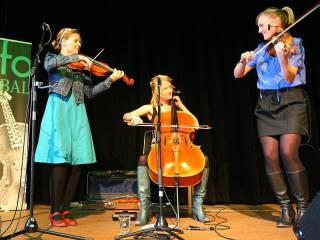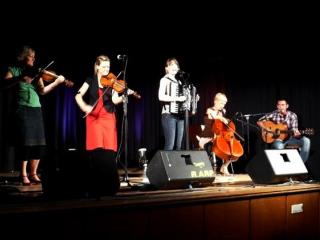Greatest hits of the 1700s set for violin, viola, cello and voice.
We meet one early spring evening in the pleasant little café in the foyer of a small hotel in Flensborg, on the German-Danish border. A fairly large group of Danish musicians and people from the international music business are talking animatedly when the street door opens and in step a trio of smiling young women carrying their musical instruments. An aura of success and self-confidence surrounds them. That's because this is the young Danish trio Fiolministeriet (The Fiddle Ministry), and they are breaking through on the German folk music scene at this very point in time. The Fiddle Ministry play Danish and European music from the 18th century, arranged for violin, viola, cello, guitar and voice sang, and this evening they are returning to their hotel after yet another in a long series of concerts, yet another full house, yet another wild success. The gathering is for the German festival folkBALTICA, and in the weeks up to the festival, The Fiddle Ministry - violinist and singer, Ditte Fromseier, violinist Kirstine Sand and cellist Kirstine Petersen – have toured all over Germany, presenting their brand new debut album.
Later, when I finally get the chance to talk to the trio, Kirstine Sand tells me that the three young women had met a couple of years previously, when they were living and studying on the central Danish island of Funen. Kirstine was working on her solo album, The Dancing Couple, and wanted to record some 18th century Danish tunes. She contacted Ditte and Kirstine and The Fiddle Ministry was launched. Ditte Fromseier explains: "When we started working seriously as a band, we looked around for music that would suit the violin, viola and cello instrumentation, and would reflect some aspects of a classical string trio. We nosed out some of the old Danish tunes from the 1700s, the fantastic music written by fiddler Rasmus Storm in Faaborg on Funen, where he lived and worked around 1760."
Kirstine Petersen is a trained classical cellist from the South Denmark Academy of Music and Drama in Odense on Funen, which also houses the country's only folk music course. "It was here I met these two wonderful girls...", she says with a smile and goes on: "... I was always impressed by the folk music at the Academy, since I grew up with classical music. I feel that my work with the girls here, and with folk music, has benefited my cello playing. It's good to get away from the printed notes every now and again, and I relish working with the others on finding music and arranging it. We're developing our own style, so to speak."

The little hotel café is a-buzz: friends and musical colleagues are busy swapping jokes, anecdotes and cds. The Fiddle Ministry have just released their debut album - a collection of 18th century melodies interspersed with Danish songs, and as we speak, news of good reviews and airplay on radio stations round the world is ticking in. There is plenty to be pleased about and the trio have many plans, but, as Kirstine Sand says: "We want to be out there playing this material all over, but right now what's in focus is getting our debut album out, and checking people's reactions, so not all our plans are in place yet. We'll see what happens..".
Things are moving fast now for the trio, it's true, but this evening in Flensborg there is time to pause, to celebrate their success with a glass of good German beer in the company of good friends. "A lot of the music we play in The Fiddle Ministry comes from really old books we find in archives all over Denmark...", says Ditte Fromseier: "In particular we have been looking at notations collected by this Rasmus Storm character. He lived on Funen, in the middle of Denmark, and his book dates from 1760. There are loads of good stories about Rasmus Storm, about how he was a farmer's son, but was so occupied with other stuff that he never took over the family farm, as he was supposed to. Instead, he went to work for an uncle known as Paul China, a well-known businessman from Funen, and he lived in Faaborg, on the south side of the island. Paul China sent trading ships out all over the world, and we don't know for sure if Rasmus Storm sailed with them, or just sat at home in Faaborg Harbour and listened to the music there. But we know that he played the fiddle, we know that he wrote these tunes down, and we know that some of the tunes are not Danish at all, but come from other parts of Europe, like Holland and France. He had his sources, and probably picked up tunes from foreign travellers coming through Faaborg."

The Fiddle Ministry girls are well aware that their concoction of Danish and European music from the 18th century, arranged for violin, viola and cello, is unique on the international folk music scene, and that has driven them to blend other styles and traditions into the music, and to start composing their own music. "Stringed instruments are central to The Fiddle Ministry's music, but we are beginning to combine the sound of the strings with songs," says Ditte Fromseier, and goes on: "One of my favourites, which we are singing a lot at the moment, is an old Danish lullaby called Mother, the Sun is Red, a song dear to every Dane. It's a melancholy thing, unusual in a lullaby, since it tells of the child's concerns for the birds and small animals who aren't tucked up in a nice warm bed like him, but are hunted by the fox. There's an incredible atmosphere about that song, and we recorded it in one take. It was late at night, it was the last thing we did that day, and the mood was perfect. We were a bit tired, it had to be done in one, and we were so pleased to get it right. I can sing some of it for you...."
And while Ditte sings Danish poet Harald Bergsted's wistful poem, Mother, the Sun is Red, to the great Danish composer Carl Nielsen's beautiful tune, my thoughts wander back to 18th century Faaborg, where a young Danish fiddler collected and wrote down a series of European hits of the day, melodies with so much power and beauty that they are the stuff of success today in Denmark and Germany for a young Danish string trio. Who knows, perhaps The Fiddle Ministry will soon be playing somewhere near you, and you can take the opportunity to hear for yourself.
English translation by Rod Sinclair.
Photo Credits:
Fiolministeriet:
(1) from website;
(2) by folkBALTICA 2011;
(3) with Emily Smith
and Jamie McClennan,
Scheersberg 2009
(from website).